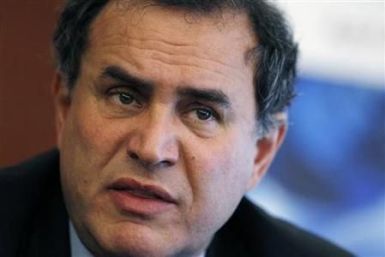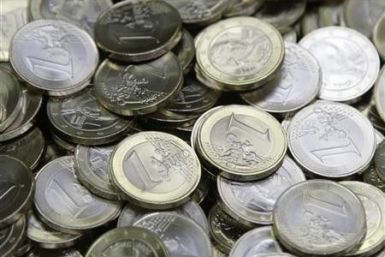Input prices jumped in Chinese and Indian factories in January, adding to pressure from food inflation that the fast-growing economies are already struggling to contain, business surveys showed on Tuesday.
Input prices jumped in Chinese and Indian factories in January, adding to pressure from food inflation that the fast-growing economies are already struggling to contain, business surveys showed on Tuesday.
China's factories slowed a touch in January under the weight of monetary tightening, but input prices rose quickly, keeping the pressure on the government to tackle inflation despite easing growth.
China's factories slowed a touch in January under the weight of monetary tightening, but input prices rose quickly, keeping the pressure on the government to tackle inflation despite easing growth.
Gold fell on Monday, notching its first monthly decline in six months, as strong U.S. factory and spending data coupled with fading worries about the euro zone debt crisis put a damper on the metal's rally.
Swirling turmoil in Egypt will likely spread to other regions of the world and may impart a negative effect on economic growth and contribute to higher consumer prices, according to Nouriel Roubini, chairman of Roubini Global Economics.
U.S. stocks rose on Monday on strong earnings and merger activity, overshadowing concerns about the possible spread of unrest in Egypt which had caused a sharp selloff in world stocks on Friday.
Kenya's inflation rate rose to 5.42 percent year on year in January from 4.51 percent in December on higher food prices, rents and school tuition costs, a source at the statistics office said on Monday.
China's central bank, more hawkish on inflation than other parts of the government, has gained more policy-making power in recent months by outmaneuvering pro-growth factions in wrangling over the economic outlook and bank loans.
U.S. consumer spending rose more than expected in December to post the sixth straight month of gains as households drew down on their savings to fund purchases, government data showed on Monday.
[Gold] buying continued on fears the unrest in Egypt will spread across the Middle East, says Richcomm Global Services in Dubai. But Asia's gold market is less sensitive to what happened in Middle East compared to New York, said a Hong Kong dealer in a note this morning.
Investors have pulled out hundreds of millions of dollars out of riot-torn Egypt since the uprising began last week, leading to fears that if the crisis continues, Egypt may not have enough in currency reserves to prevent a longer-term economic and financial crisis.
Inflation in the eurozone rose to 2.4 percent in January from 2.2. percent in December, according to the preliminary estimates of Eurostat, European Union's official statistics agency.
Fundamentals and nasty surprises are on investors minds heading into February, with big tests in the coming week about jobs and inflation and increasing worries over Egypt and its region.
Quantitative easing by the Federal Reserve and other central banks cannot address fundamental economic problems but may lead to excessive global liquidity and competitive currency depreciation, China's central bank said on Sunday.
Quantitative easing by the Federal Reserve and other central banks cannot address fundamental economic problems but may lead to excessive global liquidity and competitive currency depreciation, China's central bank said on Sunday.
India is concerned about high global commodity and oil prices and will consider cutting import duties on more food products to curb inflation gripping Asia's third-largest economy, its trade minister said.
Soaring inflation and rate rises are starting to hit corporate margins in India, tempting more foreign fund managers to slash holdings in favour of markets that can better capitalise on the global economic recovery.
Gold futures are likely to recover from their 13-week low this quarter and extend their rise further to breach 21,000 rupees by the end of the third quarter, analysts and importers said.
China has blocked the search for Egypt on Sina's microblogging service, reported Al Jazeera.
Burundi's annual inflation rate dropped to 6.5 percent last year from 10.5 percent 2009 thanks to lower food costs, but prices will likely rise again in 2011, the country's statistics board said on Friday.
China has no need to revalue its yuan currency for trade reasons, as export growth will slow to a still strong 10 percent this year and its surplus is set to contract by 2015, its trade chief said on Friday.






















